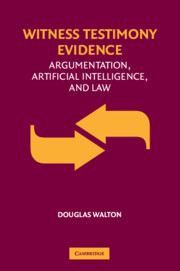Book contents
- Frontmatter
- Contents
- List of Figures and Tables
- Acknowledgments
- Introduction
- 1 Witness Testimony as Argumentation
- 2 Plausible Reasoning in Legal Argumentation
- 3 Scripts, Stories, and Anchored Narratives
- 4 Computational Dialectics
- 5 Witness Examination as Peirastic Dialogue
- 6 Applying Dialectical Models to the Trial
- 7 Supporting and Attacking Witness Testimony
- Bibliography
- Index
5 - Witness Examination as Peirastic Dialogue
Published online by Cambridge University Press: 03 February 2010
- Frontmatter
- Contents
- List of Figures and Tables
- Acknowledgments
- Introduction
- 1 Witness Testimony as Argumentation
- 2 Plausible Reasoning in Legal Argumentation
- 3 Scripts, Stories, and Anchored Narratives
- 4 Computational Dialectics
- 5 Witness Examination as Peirastic Dialogue
- 6 Applying Dialectical Models to the Trial
- 7 Supporting and Attacking Witness Testimony
- Bibliography
- Index
Summary
Trial lawyers tend to see a trial from an adversarial viewpoint and tend to be highly skeptical of the notion that the examination of a witness in court could be seen as a species of information-seeking dialogue. But if you look at the trial from a wider viewpoint, say that of a judge, part of the purpose of it should be to bring the true facts of a case to light. This aim can best be achieved through the testing of the arguments of both sides in an adversarial clash, we hold. But it should not be a pure quarrel. The trier is more likely to get a better idea of what the truth of the matter really is through the information that witnesses can provide. On this basis of what the trial should really be about, it is argued that ideally, in a trial, witness examination should be assumed to have the function of bringing out information. But in practice, especially given the adversarial system of Anglo-American common law, the purpose that the examining counsel has is that of advocacy. In Chapter 5 it is argued that the best way to normatively model the argumentation in such a trial is as persuasion dialogue based on a special type of examination dialogue that is a species of information-seeking dialogue.
This chapter will show that it is a special kind of information-seeking dialogue that is involved in legal examination. Information-seeking dialogue seems to be very common and, on the surface, unproblematic.
- Type
- Chapter
- Information
- Witness Testimony EvidenceArgumentation and the Law, pp. 194 - 243Publisher: Cambridge University PressPrint publication year: 2007



